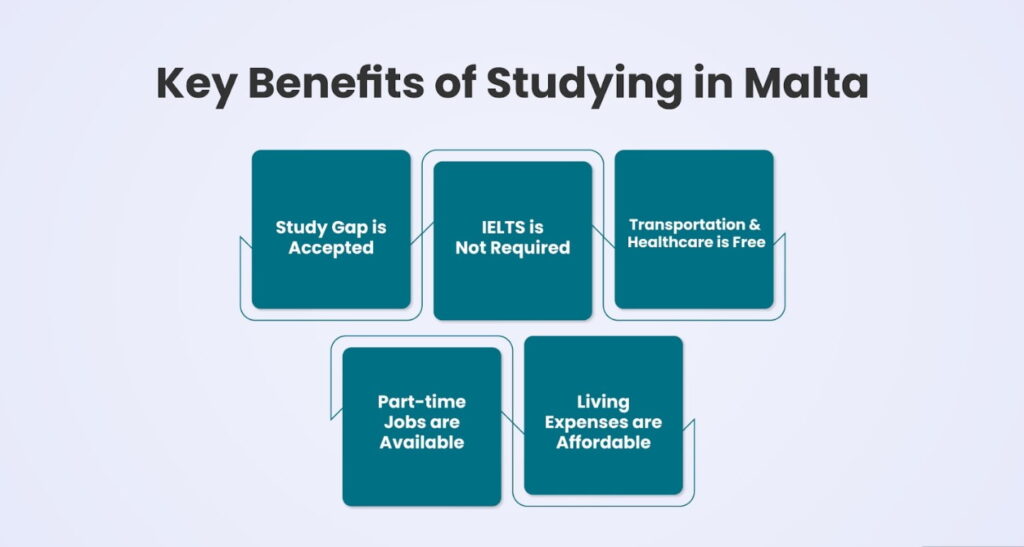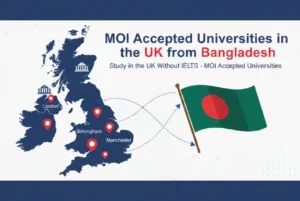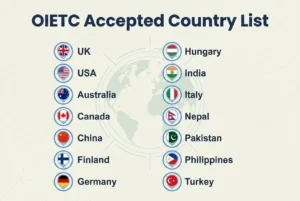Do you know why Malta is very popular among international students? Affordable living, Academic excellence, Cheap tuition fees, Cultural heritage, Pleasant climate, etc, are some top reasons to study in Malta for international students.
Malta is currently the most attractive destination among international students and is ranked as one of the fastest-growing economies in the European Union. This country, located in the south of Europe and the middle of the Mediterranean Sea, offers many benefits and facilities for students who want to live and study in Malta.
Malta has many things that encourage international students to study abroad on this island. Whether you’re seeking adventure or finding a place welcoming to study, Malta can be the best option for you. Let’s explore the 10 top reasons to study in Malta.
Key Highlights of Malta
Moving to Malta is pretty simple, especially if you live in one of the Schengen countries. In that case, you don’t need a visa. Malta is also a member of the EU. Let’s explore some key highlights of Malta.
| Capital City | Valletta |
| Currency | Euro |
| Official Language In Malta | English |
| Deadline For Application In Malta | All Year |
| Average Tuition Fee In Malta | €6,000-€20,000 per semester |
| Average Tuition In Matla for Medicine | €3000 / Semester |
| Can students work in Malta? | Yes – 20 hours per week |
| Is Malta a Schengen Country? | Yes |
| Degree Acceptance | All EU Countries |
| Student visa success rate in Malta | 85% approx |
Top 10 Reasons to Study in Malta
Malta is a top study destination due to its affordable living costs, high-quality education, English-speaking environment, and cultural richness. The country offers a diverse and vibrant student community, making it a welcoming place to study and grow. Let’s explore the 10 best reasons to study in Malta.
Affordable Living Cost
Living costs in Malta are lower compared to other European countries. On average, you’ll spend 300-500 EUR per month, not including rent. Universities and colleges in Malta offer student dorms, which are cheaper than renting private accommodation in Malta. After getting a student visa for a university in Malta, you can easily ask them about dorm options.
High Quality Education
Maltese colleges and universities follow the British curriculum. For British students, Malta’s education system will feel very familiar. Primary school lasts six years, and secondary school lasts five years. After that, students go to college or sixth form to take the Matriculation certificate, which is similar to British A-Levels. Malta is home to the world’s best universities that offer internationally recognised degrees, ensuring a solid education.
English is the Official Language of Malta
One of the best advantages of studying in Malta is it has a bilingual population where English and Maltese are both spoken smoothly. Since Malta was once a British colony, most people grew up speaking two languages: Maltese and English. However, English is the official language of Malta. So, learning Maltese is not a mandatory requirement for a Malta student visa.
Affordable Tuition Fees
The cost to study in Malta is more affordable than any other European countries. Education is free in Malta for EU and Maltese citizens. For non-EU/EEA students, tuition fees depend on the university. On average, it costs around €7,000–€12,000 per year for a bachelor’s degree, and for a master’s degree, the fees range from about €10,000–€20,000. However, the tuition fees in Malta for medicine programs are higher ranging from €26,000-€38,000 (approx).
Best Career Opportunities
When starting your studies in Malta, it’s important to plan. International students can work part-time while studying in Malta. It is a great opportunity to gain real-world job experience. This experience can help you get a better job after you graduate. Malta is also a gateway to Europe because of its location, giving students the chance to explore the best career opportunities across the European Union.
Pleasant Climate
In Malta everyone enjoys a sunny and enjoying climate everywhere. The winter season is very mild in Malta. International students always enjoy the pleasant weather of Malta while studying and working there.
IELTS is Not Mandatory to Study in Malta
One of the biggest reasons to study in Malta is that you can apply without taking the IELTS exam. Even though Malta is an English-speaking country, many universities don’t require IELTS for admission. Instead, you can take other tests like the Cambridge English Qualifications (CEQ), Pearson Test of English Academic (PTE), or TOEFL. Also, you can study in Malta with your MOI certificate.
Also Read: Study in Malta Without IELTS
Study Gap is Acceptable in Malta
Another interesting reason to study in Malta for international students is the acceptance of the education gap. Even if it’s been a while since you finished your last course, you can still study in Malta.
As long as you meet the minimum score requirements of the colleges, having a gap in your studies won’t be a problem. On average, a 10-year study gap is accepted in Malta for international students. This is one of the most popular reasons to study in Malta.
Scholarships to Study in Malta
Studying abroad can be expensive for Indian students, and the same goes for studying in Malta. However, there are several scholarships available to help with the cost. Some of these scholarships are:
- Commonwealth Scholarship
- ACES Scholarships
- Fulbright U.S. Student Program
- Erasmus+ Scholarship Programs
- Malta Government Scholarship Scheme, etc.
Transport is Free for Students
One of the interesting reasons for choosing Malta for higher studies is that you can move here and there for free. If you’re a foreign student enrolled in a course longer than 3 months, the Maltese government gives you free access to public transport.
Once you’re registered as a student with the transport company, you’ll get €21 added to your bus card every month. This is enough for unlimited daytime bus rides. However, night buses have different fares.
Part-time Work Opportunities for International Students
Malta’s recent economic growth has led to policies focused on attracting skilled workers for various sectors. Students now play an important role in the workforce. Overseas students are allowed to work 20 hours a week while studying in Malta.
If you’re studying for a bachelor’s or master’s degree, you can stay in Malta for up to 9 months after finishing your studies. During this time, you can search for a job and change your student visa to a work permit in Malta.
Popular Universities in Malta for International Students
The education system in Malta is well-known because its universities follow the British curriculum. Here are some of the best universities in Malta for students from Bangladesh.
- Ascencia malta
- GBS Malta
- University of Malta
- American University of Malta
- Malta College of Arts, Science and Technology (MCAST)
- St. Martin’s Institute of Higher Education
- Queen Mary University of London (QMUL) in Malta
- STC University
- Advenio eAcademy
- London School of Commerce Malta, etc.
Is Studying in Malta Worth it?
Malta is known as one of the most peaceful countries in the world and offers a great environment for international students. Even though it rains often, Malta enjoys 300 days of sunshine each year. The country also has beautiful beaches, Mediterranean weather, and some of the cleanest seas, making it a perfect place for both adventure and learning in a new setting.
Malta is also known for offering free healthcare to overseas students. There are many public and private hospitals across the country, so healthcare is easy to access. Healthcare costs in Europe are generally lower than in places like the United States. Most healthcare services in Malta are free. If you’re admitted to a hospital, you’ll also get free medicine for three days after you leave.
There are 20 universities in Malta, with the University of Malta, the American University of Malta, and the Malta College of Arts, Science, and Technology being the top-ranked according to the QS World University Ranking 2025.
Malta offers two popular intakes for international students. The Spring intake in Malta starts in February, and the Autumn intake in Malta starts in September/October.
You don’t have to struggle with the English language requirements in Malta, tuition fees are affordable, scholarships are also available, the visa success rate for Malta is high, etc. By considering those terms Studying in Malta is worth it for international students.

Student Life in Malta
Student life in Malta is outstanding. Life on this beautiful island has a lot to enjoy, from lively festivals to outdoor plays and concerts. Don’t miss the jazz festival in July or the summer festival with food and fireworks. The nightlife areas of Paceville and St. Julian’s have all kinds of clubs, while restaurants and cafes serve traditional treats like pastizzi and Ftira bread. You’ll also spend plenty of time on the beach, going on boat trips, and exploring hidden caves.
Final Words
In summary, Malta is a growing country and a great choice for international students looking to study abroad. The universities in Malta are good, and the cost of living and tuition fees are affordable. Plus, overseas students can also apply for scholarships there. So, if you want to study in Malta for higher studies, you can contact AIMS Education.





